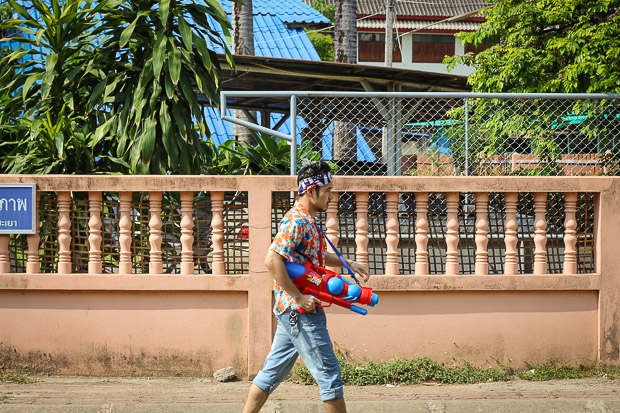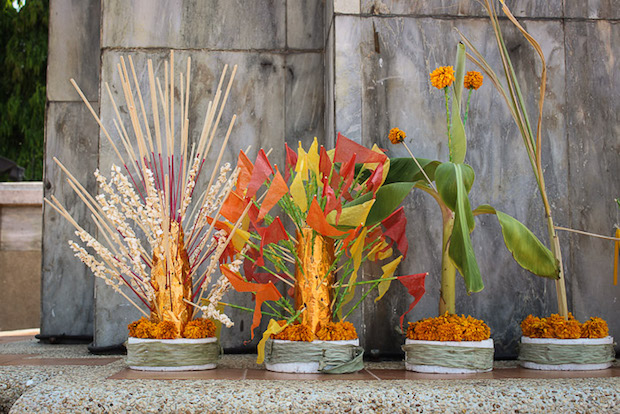
The Softer Side of Songkran
As a foreigner, when you hear or read about Songkran, you often hear about the crazy “largest water fight in the world”. It can get really crazy. For three days to celebrate the Thai New Year (which is based on the lunar calendar and actually celebrated throughout much of Southeast Asia) businesses close, workers get vacation time and everyone lets loose a bit. It’s the hottest time of the year, with much of the country roasting in the 100s (low 30s Celsius) day in and day out and throwing water around is not only fun, but provides relief from the heat.
Especially in Chiang Mai – which arguably sees the country’s longest, largest, craziest celebrations – the partying, splashing and “anything goes!” attitude overpowers Songkran’s traditional practices and origins. However, even though Thais will wholeheartedly get in on the action, there’s still a strong sense of tradition and ritual that many tourists probably don’t recognize at first.
More than just cooling off though, Songkran is a time to spend with one’s family, make merit by giving food or money to the temple, and show respect to not only the Buddha, but one’s elders, including parents, grandparents and special teachers.
Sand pagodas
As it gets closer to Songkran you’ll start to see piles of sand at temples that are decorated with flags and banners. Supposedly, this started as a way for people to make merit by bringing sand back to the temple that had been taken away over the course of the year from people walking in and out of the temple grounds.
Now some communities will hold contests for who can build and decorate the most impressive sand pagoda which are often decorated with color paper flags and banners.

The base of the sand pagodas

You can’t really see it, but there’s a pile of sand buried in there
Visiting the temple
Visiting a temple (or several) is an important part of all Thai holidays and Songkran is no exception. Especially early in the mornings, the temples during Songkran will be busy with locals offering food, goods and money to make merit and many temples will also hold special merit making ceremonies.
Families will also head to important sites or monuments within a city, such as the Three Kings Monument in Chiang Mai or the one in Phayao pictured below commemorating the cities’ founding kings, to show their respect.

Sand pagoda at Wat Phra Singh in Chiang Mai

Families make visits to special temples and monuments, like this statue of a famous king in Phayao province
Pouring water
On the third and final day of Songkran, known as Wan Payawan, families will gather together to pour silver cups of water (the same as these) that have been perfumed with flowers to gently cleanse Buddha images at the temple or in their own home. Younger family members will pour the sweet-smelling water over the hands of their parents and elders as a sign of respect and blessing. Many families will also take this time to clean the house so their lives are cleansed and ready to start a new year both spiritually and physically.
While in parts of Bangkok or Chiang Mai the street water fights will still start pretty early in the morning, in other parts of the country the water splashing won’t begin until later in the afternoon after families have had a chance to gather and go to the temple.

Pouring water over a statue of a past king

King Ngam Mueang of Phayao who ruled more than 700 years ago
Along with the pouring of water, people will smear white powder onto each other’s faces which is thought to bring protection and good luck.
Of course, in the end, having fun and enjoying oneself is still really important. There aren’t many holidays that allow the Thais to let loose so everyone seems to welcome not only the break from the heat, but also some strict social conventions.

Just chillin…
Have you experienced Songkran in Thailand before? Would you do it again?
Hey! I'm Alana and I've spent nearly the past decade living in Chiang Mai, Thailand, working as a writer and photographer. I started Paper Planes as a place to share local insight, special places, and how to travel well through a range of experiences — from hostels to high-end hotels, street meat to multi-course meals.
New places are always calling my name...
4/16/15
Leave a Reply
let me join you in your inbox
Enter your email for a taste of different worlds, must-read posts, and special offers.
(Don't worry, I'll never spam you — just send the good stuff.)

Lovely photos and very informative post, Alana! I’m really enjoying your articles.
That’s interesting!
I had thought about trying to arrange my travels so I’d be in Thailand for the festival, but it was just way to inconvenient. Its nice to learn more about it- you always just see pictures of backpackers with water guns.
Backpackers with guns is a big par of it too 😉 particularly in touristy areas
I just experienced my first Songkran and had one of the best times! I definitely experienced the more typical aspect, but it’s cool to read and learn about the actual holiday. Thanks!
Thanks for reading, Dave – glad you had fun during Songkran!